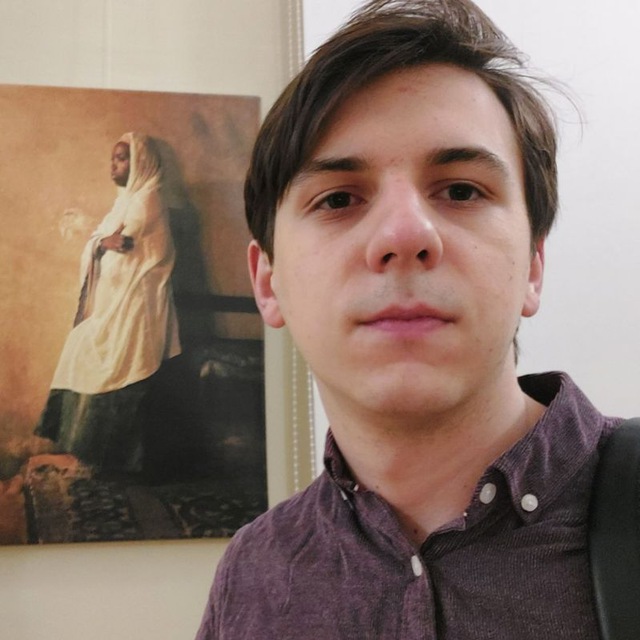Oleksandr Yanchenko's Journey: Ukraine to the UK

Oleksandr Yanchenko's Journey: Ukraine to the UK
Oleksandr Yanchenko recently joined the Vandu Languages team as one of our Booking Coordinators. Originally from Chernihiv, a city in Northern Ukraine, he shares his journey to the UK and how it has transformed his life.
Educational Background
Oleksandr studied International Relations at the National University of Kyiv. “It was actually theory for International Relations, so it’s more about different approaches… kind of political studies and history” he explains. During this time, he also contributed to his family's business in Ukraine.
When taking a deeper approach to Oleksandr’s interests, we found out that history unfolds as a big passion in his life. This passion fuelled his determination to complete his master's dissertation during the springtime, all while residing in the UK. The topic that he chose it is also a very interesting one: Religious soft power in politics of Medieval Europe.
He kindly explained to us that soft power refers to political influence that affects people’s conducts and evolves into the transcription of such beliefs in the form of art, books, symbols, and other cultural representations.
“This theory -soft power- was invented in the 1980s by Joseph Nye, and since it’s modern-day theory, it was interesting to apply it to a distant historical period” he says. “There weren’t any countries at that time (in the modern-day sense), so it was just huge territories that were loyal to a certain monarch, it was a completely different world”.
Journey to the UK
The current conflict between Russia and Ukraine can be dated back to 2014, when Russia annexed Crimea, a peninsula on the northern coast of the Black Sea that was previously under Ukraine's sovereignty.
In the next 8 years, the conflict persisted, and the political tensions were stronger each time, with naval incidents and cyber-attacks. The situation escalated dramatically in 2022 when Russia executed a full-scale invasion of Ukraine. This marked a turning point, as the frequency and impact of attacks intensified, leading to daily civilian casualties, bombings, and deliberate war crimes that severely affected people's safety and well-being.
Due to the deteriorating situation, many Ukrainians sought refuge in neighbouring countries. Oleksandr and his wife made the difficult decision to leave Ukraine in September 2022, primarily to protect their three-month-old daughter.
“But we didn’t choose Britain randomly, we both liked it previously. My wife even dreamt of living in Brighton, East Sussex, when we met five years ago, because she knew about it.
“We had a few different options, we could go to Germany as well, but we chose Britain and a significant part of our choice was that we had long chats with our current hosts, and we thought they were very close to us, and we still feel like this because they perceive my daughter kind of as their grandchild”.
Ukrainian influences
When asked about his culture, Oleksander grabbed this opportunity to take us back in time once again and give us the following response:
“We weren’t a proper state for much of our history, but we were part of the Polish-Lithuanian Commonwealth, and we had Cossacks states -Cossacks being the military class -, they all had a very interesting freedom-love culture, so we had a tradition of self-respect, we had very nice Baroque culture, and I really enjoy that. It’s all things that we should preserve carefully.
“Also, regarding modern-day Ukraine, our people are very brave, and we are a very interconnected society, not very polarised.
“Even though the Soviet Union has affected Ukrainian people in a bad way in many senses, many people are uniting to collect money, food, and medicines. We have a good government which does its job, but the people play a significant part of many important things”.
Oleksandr also shared his passion for Ukrainian Cossack music from the 17th and 18th centuries, describing it as a reflection of beauty, life, and freedom - a philosophy deeply embedded in Ukraine's history.
Languages
Oleksandr is fluent in both Ukrainian and Russian and has some knowledge of Spanish.
Ukrainian is his mother tongue, but Russian was also present during his upbringing. At the time, Ukraine was under Soviet occupation, and within their policies they aimed to make Russian the main language in the country, including the educational system, which resulted in many people having to learn the language.
The story with Spanish is much different. It began during university when he was placed in a Spanish-language group. He had the option to change to another group, but he saw it as an opportunity to learn about a language and a culture that it was unknown to him. He spent the next five years learning Spanish, and now he can understand conversations and even speak some of the language himself.
Vandu Languages
As a Booking Coordinator at Vandu Languages, Oleksandr works closely with interpreters and requesters, ensuring customer satisfaction and attending to their needs on time.
Our interpretation services cater to businesses, organisations, and individuals in need of communication with people who speak languages other than English – a crucial factor in the global business landscape. Our services facilitate access to local and government services, including healthcare and education, for people from diverse cultural backgrounds.
To learn more about our interpreters, please click here. If you're interested in exploring our other services, such as translation and bilingual advocacy, click here.
